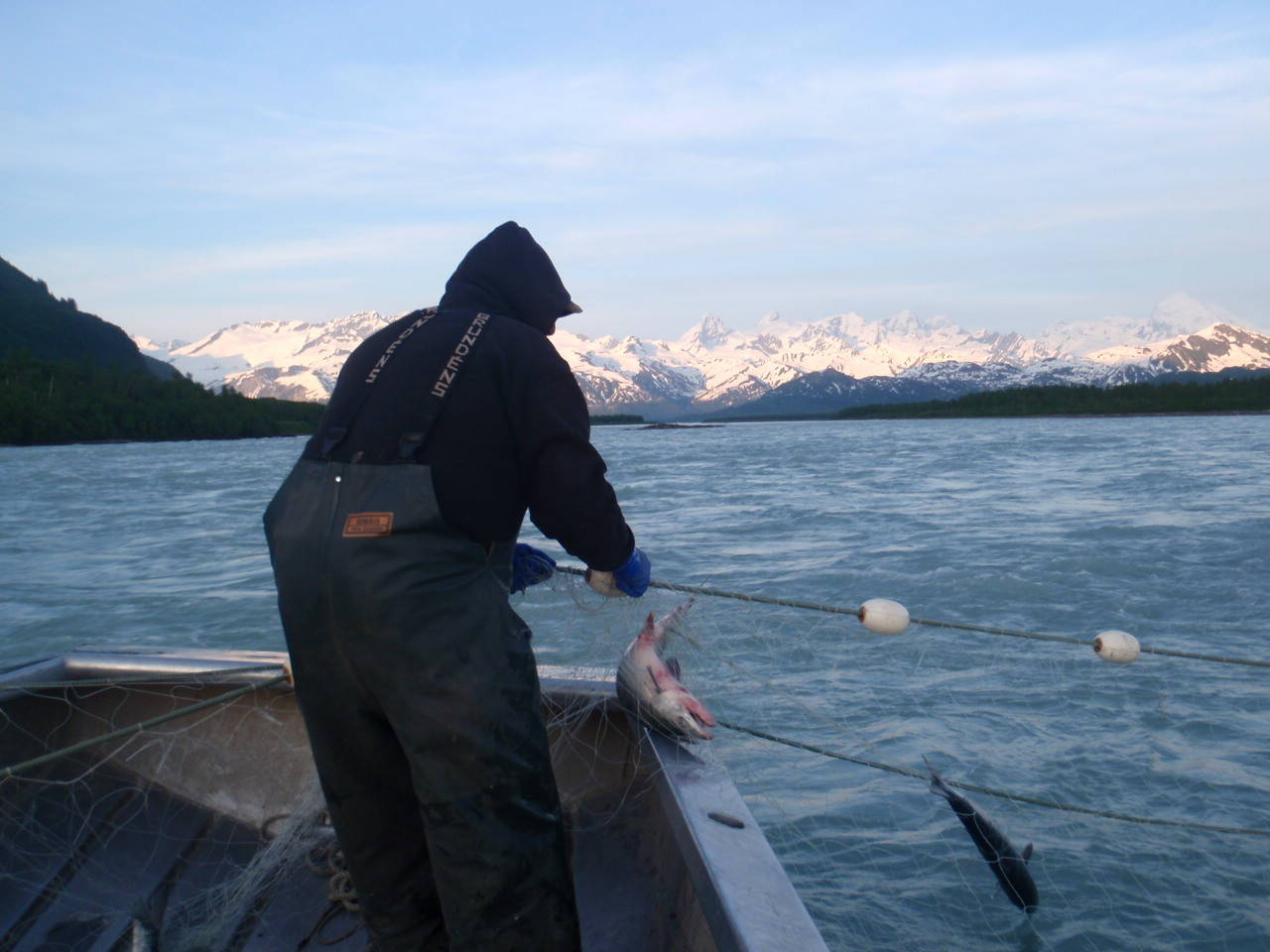Add Yakutat’s wild sockeye run to a growing list of struggling Alaska salmon stocks.
The Alaska Department of Fish and Game shut down set net fishermen in the Yakutat District on Thursday after fishery managers determined less than 10 percent of the historical average have returned. Weirs on the Situk River have counted only 1,700 returning sockeye this year. That’s down from an average of 20,000.
It’s the smallest return on record for this time in the year and a dropoff managers did not predict.
In his 50 years working in the fishery and as a permit holder, Yakutat set net fisherman Jeff Lowenstein said he’s never seen the entire set net fishery shut down.
“It’s horrible,” Lowenstein said in a Thursday phone interview. “They’re still allowing subsistence, but I have a feeling they might even cut that off.”
Situation not normal
Nicole Zeiser, the Yakutat area management biologist for the ADFG division of commercial fisheries, said wild sockeye runs had been consistently healthy that before this year. Outside of 2008, there hasn’t been any biological concern for the fish, Zeiser said, and nothing managers saw in recent years indicated that returns would fall so hard, so fast.
Zeiser said they did have to shut the district down in 2008. But even that year showed much higher returns. The number of outgoing fish for this year was “excellent,” Zeiser said, and early predictions were high.
“Projections were for average to above average runs. The escapement brood years were excellent across the Yakutat area. For the Situk alone, the brood year escapements were above the top end,” Zeiser said.
Managers want to see between 30,000 and 70,000 fish make it into the Situk River for a healthy run to reproduce. At this point, they expect to see about a quarter of the run past weirs. If the run continues to underproduce, it’ll fall well short of that goal at about 11,000 fish.
Subsistence fishing has been allowed to continue for 36 hours a week, Zeiser said, but could shut down on a moment’s notice if ADFG determines further conservation is needed. Normally, ADFG allows subsistence fishing all week when not running the commerical fishery. But the Situk’s sockeye run is far from normal this year, so they’re keeping subsistence fishing at its 36-hour limit.
Zeiser said they’re not sure what happened to Yakutat’s sockeye. Managers think survival rates in the ocean have something to do with it. Fisheries scientists have pointed to warm water in the Gulf of Alaska as a contributing factor.
Economy braces
The shutdown has left Yakutat reeling, according to Yakutat Seafoods owner and manager Greg Indreland. The economy in the 600-person village depends heavily on commercial fishing, Indreland said. Set net fishermen there make about $15,000 a year, Zeiser estimated, and many work other jobs during the offseason or depend on subsistence foods.
Yakutat Seafoods pays out about $1.5 million every year to local set net fishermen, and at the peak of the summer salmon season, the company’s processing plant employs about 70 people. About 40 fishermen sold fish to Yakutat Seafoods during an opening last week, Indreland said.
“Salmon is the thing that really turns the engine here,” Indreland said.
The community is now hunkering down for a largely salmon-less summer. Some people, Indreland fears, may just move to the city. The shutdown will hurt both psychologically and physically, Indreland said.
“In these situations, some people are mentally and emotionally stronger than others. They will have to hold up the ones that aren’t. There’s going to be a real telling of how strong this community is,” he said.
It’s a situation comparable to the housing crisis and stock market crash of 2008, he said.
“You remember when we had the stock market crash in ‘08, we had mad panic and retirees watching their savings just crumble. … We don’t have as many zeros here, but that same panic, because they don’t have — there’s no jobs here — the reliance is on this fishery, not only for income but for putting food up for the winter,” Indreland said.
Indreland said he’d try to place some of the workers at his processing plant at sister companies in Bristol Bay, but that’s not a sure thing. He’s working on a budget to keep some of his employees working four days a week on volunteer projects like painting the homes of elders.
A slow start for the state
A weekly salmon harvest report released Thursday shows a slow starts for harvests across the state. According to consulting firm McDowell Group, the total number of salmon harvested in 2018 is about half of 2017 and the five-year average for this week in the year. (Those figures include adjustments for pink salmon, which only return in bulk every two years.)
Slow sockeye harvests on Prince William Sound, Kodiak and Chignik spell a dire picture for sockeye harvests, though sockeye returns in Bristol Bay, Alaska’s biggest sockeye run, should accelerated in coming weeks.
Chinook runs are down nearly everywhere. The underperformance of high profile Copper River king salmon was a “shot across the bow” that something was happening to salmon in the Gulf of Alaska, Indreland said.
“It’s like death, you know it’s coming, but you really don’t want to get there,” Indreland said.
• Contact reporter Kevin Gullufsen at 523-2228 and kgullufsen@juneauempire.com. Follow him on Twitter at @Kevin Gullufsen.

